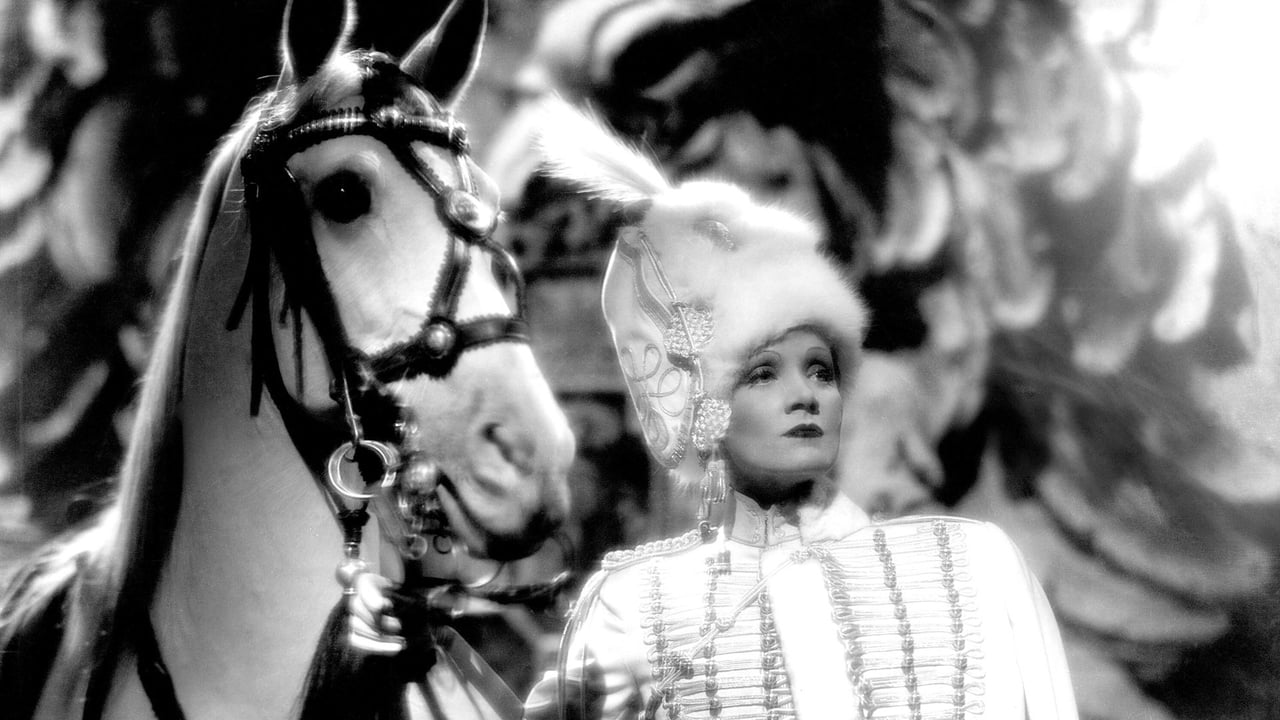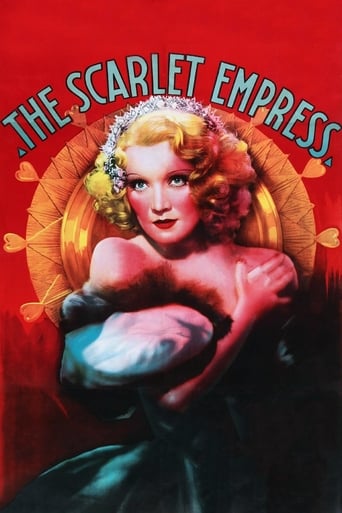

Instant Favorite.
... View MoreDreadfully Boring
... View MoreThe film makes a home in your brain and the only cure is to see it again.
... View MoreIt's a good bad... and worth a popcorn matinée. While it's easy to lament what could have been...
... View MoreThere's a case to be made that the Dietrich/Sternberg films may actually have been better as silent films, as a lot of the time the talkiness is the weakest, creakiest part, especially when compared to the images, which are so immaculate. Almost every frame of this film would look great blown up and mounted on a wall, and Dietrich looks like a religious icon most of the time, especially lit by candlelight during the wedding scene.The excesses of this film are second to none, and for sheer lurid spectacle, you can only really compare it to Cecil B DeMille, though this is a far more beautiful and well-told tale than anything DeMille ever made. There's nudity and adultery and torture and all that good pre-code stuff that would disappear from Hollywood screens for decades only a year later. This was the last gasp of freedom and it's a gasp everyone should share at least once.
... View MoreWell, it seems that you either adore this movie or you hate it. I'm glad to see that we who like it, have the advantage. One of the main objections to the movie seems to be that it is historically inaccurate. Have YOU ever seen a movie that was historically accurate? I haven't - unless it was a documentary, and even then it was rare to agree with everything I saw on the screen.Frankly, I don't usually care if a movie really is totally inaccurate. I see movies as vehicles of escape, not of information (either true, false or in between). And this fantastic recreation of Tsarist Russia, featuring Peter Ballbusch's weird sculpture and showing off some masterful photography (credited to Bert Glennon) is a spectacle you will never forget. The whole cast is superb! And the direction magnificent!
... View MoreHistorically speaking, the film must count as one of the grossest abominations in a Hollywood which for the longest time envisioned anything laying east and south of the Danube as uncharted, barbarous darkness. Young Catherine arrives in Russia practically a child, only to be greeted by the scoldings of another overbearing mother, an Orthodox patriarch perched beneath an ungodly gargoyle, and a half-mad imbecile for a husband.The whole of the Russian court turns out to be not much different from the vile stories of atrocity she was narrated to as a child, one after another a series of machinations at the hands of the half-mad.But of course history was never the purpose for Sternberg, these stories at the beginning of the film he visualizes in the manner of pages from a book. So a fiction malformed from history, a book of images, ostensibly based on the diaries of the real person, in turn a history malformed from the real thing, with Dietrich stage center, shining, radiant.It was always Dietrich that validated film for Sternberg, the image of seductive beauty that could seduce beauty from the camera. But in several ways, I feel that Sternberg deteriorated upon joining up with her much like the hapless professor in Blue Angel. His art was tortured before, anguished with emotion, but since Dietrich it seemed to be solely consumed by her at the expense of all else.Nowhere is this more evident than here, no pretense about it anymore. Dietrich is quite literally queen, destined to be, and the whole thing around her merely provides the tortured circumstances for the scene of triumph. There is so much cacophony when she does finally triumph that it makes you think Sternberg has finally gone unhinged from so much pained adoration, that he doesn't quite know when to separate one feverish fantasy from his own. A cavalcade storms inside the palace and up the expansive staircase, a bell rings, ringing bells across the country, crowds rejoice, that were earlier silently praying, and Dietrich is finally ushered on shoulders into the church swarmed with banners on all sides to be crowned empress. Ride of the Valkyries clangs away in bombast for the duration.But this is the thing that strikes the most vividly, the crowning luxurious decadence of the whole enterprise. Even in the grip of what seems like lovestruck paroxysm, Sternberg could envision farther than most at the time. And when he failed, he failed more spectacularly than anyone could, in the most interesting ways to see.It baffles. It exhilarates with the sheer monstrosity of the caricature. It overwhelms any sensibility that is fine, any sense of good taste. You will never see more a outrageous depiction of an Orthodox church ever, the frescoes of saints bordering on a surreal that is blasphemous. Or more styrofoam gargoyles in one studio lot palace.So the frame is overflowing with anguished, fiendish luxury; but everything that is grossly portrayed here, was actually taking place on that studio lot. Whatever was going on in 18th century Russia, at least this thing was actually happening in Hollywood, that would go to such lengths to envision and stage such a dazzling darkness. A cavalcade was made to storm up a staircase. And there was this woman at the center, flickering before the camera like the flame of the candle she holds at one scene, finally lighting up the place.So it is apt to recast the whole thing as Dietrich's journey, mirrored from the other, from her faraway home into the court of a foreign country, with every spotlight on her, every male pair of eyes.The first part is sourced out as a kind of Alice in Wonderland; the girl enters a strange world, apprehensive, fearful, a world that would reduce her to size, where she must fit through doors too big, wait for the queen or lose her head, finally descend into a rabbit hole and come out the other end the mother of a heir.But in the second part she becomes the Dietrich we know and have come to see conquer with fierce beauty, the Lola that first broke hearts in Blue Angel; the whole film around her transforms into the restless dream that men were dreaming about her. The idea is that she becomes that dream, operating the image from inside. It is not a good film all else considered, the overcooked bombast, the intertitles that never shy away from revealing the full implications of the most obvious detail, but it's a mess you should see, just for how madly passionate.
... View MoreGorgeous B&W photography of lavish palace interiors, a background score of classical music used effectively, and an interesting tale of royal intrigue all combine to make THE SCARLET EMPRESS a visually impressive showcase for the photogenic beauty of Marlene Dietrich under the direction of Josef von Sternberg. Indeed, it's probably near the top of all the films she did with one of her favorite directors.MARLENE DIETRICH goes convincingly from a naive and timid girl to a woman fully aware of her powers of seduction, making the transition very persuasively with little nuances of characterization that ring true. JOHN LODGE makes a dashing Count Alexei, who has the tables turned on him toward the end after she finds out he's been making midnight visits to the chamber of Empress Petrovna (Louise Dresser) and finds a way to retaliate. LOUISE DRESSER makes a formidable Empress although her voice lacks the commanding style of her acting. SAM JAFFEE is excellent in an almost thankless role as the mentally challenged Grand Duke Peter.Sumptuous to look at, it owes a great deal to the fluid photography and direction, as well as the forceful and constant use of classical background music, unusual for a film made in '34, which adds to the film's atmosphere and mood.Well worth seeing with Marlene Dietrich at her most alluring, exquisitely photographed by Bert Glennon with stunning art direction by Hans Dreier.
... View More